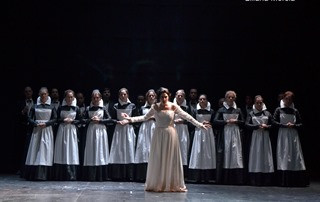|
Back
Donizetti Meets Sade Buenos Aires
Teatro Avenida
03/21/2014 - & March 23, 25, 27, 29*, 2014
Gaetano Donizetti: Anna Bolena
Christian Peregrino (Enrico VIII), Macarena Valenzuala (Anna Bolena), Florencia Machado (Giovanna Seymour), Walter Schwarz (Lord Rochefort), Santiago Ballerini (Lord Riccardo Percy), Luciana Mancini (Smeton), Maurio Di Bert (Sir Hervey), Clara Alonso Iglesias (Isabel)
Orchestra and Chorus of Buenos Aires Lírica, Juan Casasbellas (Chorus Master), Rodolfo Fischer (Conductor)
Pablo Maritano (Director), Andrea Mercado (Scenic Design), Sofía di Nunzio (Costumes), José Luis Fiorucci (Lights)

M. Valenzuala (© Liliana Morsia)
This was the first opera of the season in Buenos Aires. As many may know, North America’s Spring is the southern hemisphere's Fall, and hence late March is the beginning of the season in Argentina. The Donizetti opera was not given at the famous Teatro Colón, but at the much more modest, yet functional and aesthetically appealing Teatro Avenida by Buenos Aires's second opera company, Buenos Aires Lirica. Though less elitist and more populist than the venerable Colón, usually giving 19th century Italian opera with the occasional Mozart or French opera, its stagings are often innovative. With populism and affordable prices comes an authentic enthusiasm rarely seen in opera today.
Chilean soprano Macarena Valenzuela as Anna Bolena was the strongest element in the production. With the exception of the high note at the end of Act I, Valenzuela got all the high notes with ease. It was refreshing to hear a singer with natural trills sing this Donizetti role. Her voice blended well with that of mezzo Florencia Machado. As Giovanna (Jane) Seymour, Machado impressed more with her stage presence and dramatic flair than with her voice. Winner of Neuestimmen Contest in 2012, the mezzo has an important voice but its quick vibrato may not be the most suited for bel canto roles. Christian Peregrino portrayed a different kind of Henry VIII, more cruel and devious than the already unlikeable character. Vocally, he was appropriately menacing. Santiago Ballerini as Percy had the appropriate lyric tenor voice but stage director Pablo Maritano opted to reinforce the physical limitation of the short tenor, making him more of a comic role than a romantic lover. Given his excellent technique and style, it seemed like a cruel gimmick to generate some comic relief in this intense drama. Luciana Mancini was a convincing Smeton, vocally pleasing and dramatically at ease in the trousers role.
In the earlier part of the opera, Bolena acts like a childish queen irked by her husband's infidelity. She made her entrance wearing sunglasses, possibly as a symbol of her ignorance of the identity of her rival and of her forthcoming doom. In his fondling of Seymour, Henry was excessively obscene. Though this may have been a historical possibility, it contrasts with the text he sings in which he evokes love rather than lust. The staging was not exactly Neue Regie but had its considerable share of unusual and often shocking elements. Whereas the women were dressed in period costumes, the men wore modern garb. It was perhaps to contrast the passivity of the women with the violent machinations of the men in this opera. A certain degree of sadism was in the air. Henry was not merely getting his way by sacrificing his wife, he actually seemed to savour his wickedness. This is an overkill that hinders more than helps the drama. A suspended stag was butchered by having his horned head cut off during the female chorus of Act II with the obvious allusion to Anna Bolena's soon to come decapitation. Having Henry's secretary, Hervey, deviously portrayed by Mauro di Bert, overseeing the deed and gleefully tasting the stag's blood was simply unwarranted.
Despite the often violent staging, the audience was elated by the most melodious passages of the opera. Generous applause was given to all the singers, especially Macarena Valenzuela who is a regular with Buenos Aires Lirica. In recent seasons, she has also sung Leonora in Il trovatore and Jenùfa. Indeed, the most splendid aspect of the evening was the enthusiasm of the public.
Ossama el Naggar
|